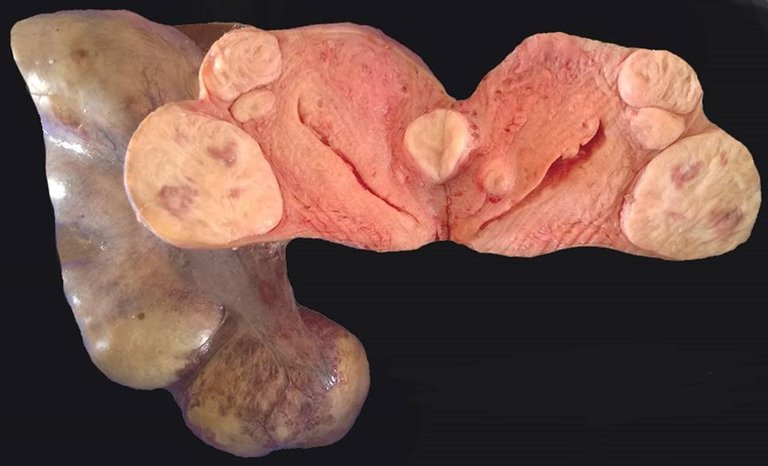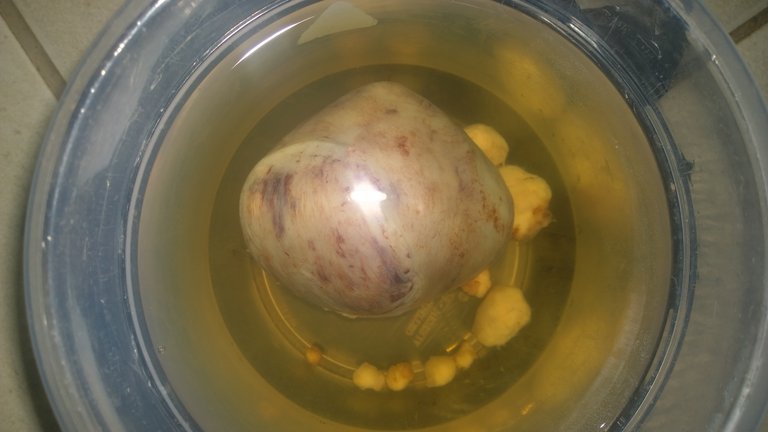When the presence of fibroid should make a woman panic.
A lot of women with fibroid, usually find out they have one when they are trying to conceive or during pregnancy in itself. Fibroid is an abnormal growth that develops on or in the uterus.
In some cases, the tumors will become quite large and begin to create serious abdominal pains and heavy periods, but in other cases, it doesn't come with symptoms at all.

Image source
The growth occurring as a result of fibroid is usually noncancerous or benign, as the major cause of fibroids is unknown. Fibroid has some other names such as; uterine fibroids, myomas, fibromas, uterine myomas, and leiomyomas.
Remember I mentioned earlier that, some cases of fibroid have associated symptoms while others do not, there are various types of fibroids and their symptoms are dependent on their location in or on the uterus;
Subserosal Fibroids: This type of fibroid forms on the outside of the uterus, in a place called serosa. The fibroid may become so big that the uterus appears bigger on one side.
Intramural Fibroids: Happen to be the most common type that exists, they appear within the muscular wall of the uterus, this fibroid type may grow very large stretching the uterus.
Cervical Fibroids: This fibroid type can develop on the cervix, which connects the uterus to the vagina, it is a very rare occurrence.
Pedunculated Fibroids: In a situation where a subserosal fibroid develops a stem, which is a slender base that serves as a source of support to the tumor, we have a pedunculated fibroid.

Image source
The symptoms felt during a tumor are dependent on the number of tumors. a person has, including its size and location. If a tumor is small or there is a case of menopause, symptoms may not suffice, there is even a possibility of fibroid shrinking during and after menopause.
In the cases of experienced fibroid symptoms, it comes with;
- An increased menstrual cramp.
- Menstrual clots.
- Swelling or enlargement of the abdomen.
- Painful sexual intercourse.
- Frequent urination.
- Pressure or fullness within the lower abdomen.
- Pain in the pelvis or the lower back.
As I said before, there is still no clear reason why women have fibroids, but some factors may contribute to their formation;
We have some families with fibroids running in their family, a family with a previous history of fibroid will possibly have it re-curring again, and sometimes, it could also be triggered by hormones here is what I mean by that, the ovaries produce estrogen and progesterone, these hormones produced causes the uterine lining to regenerate during each menstrual cycle and stimulates the growth of fibroids.
During pregnancy, there is a possibility that fibroids will develop and grow fast at this point, this is because during this stage, the body's production of estrogen and progesterone is increased.
The presence of fibroids during pregnancy could result in issues with the growth of the baby or problems during labor. Abdominal (tummy) pain during pregnancy and risk of premature labor are symptoms that fibroid comes with for pregnant women.
In the case of a large fibroid where the vagina is blocked, a cesarean section will be carried out where the baby is cut into the tummy and brought out. On rare occasions, fibroids could also lead to miscarriages.
Before pregnancy even sets in, some women may find it difficult to get pregnant in the presence of large fibroids. There are cases when fibroid prevents a fertilized egg from attaching itself to the lining of the womb and prevents the sperm from getting to the egg, but this is very rare. Submucosal fibroid makes it very difficult for women to get pregnant.
There may be no need for treatment if the fibroid comes with no form of symptom, it usually shrinks after menopause and the symptoms at the time will either ease off or disappear completely. In the case of fibroids that require treatment, medications may be recommended and when that doesn't seem to be working well, a gynaecologist will be recommended for further medication or surgery.
Surgery is a common resort for fibroid especially when the symptoms felt are severe and medication has proven ineffective. Here are some major surgical procedures used for the treatment of fibroids;
Hysterectomy: This surgical procedure is to remove the womb, it is recommended in a case of large fibroid or serious bleeding, especially when the woman has decided not to have any more children.
Myomectomy: This is a surgery carried out to take out fibroids from the wall of the womb, it is an alternative to hysterectomy especially if the woman still desires to have kids. Myomectomies are an effective treatment for fibroid, although there is a possibility of having it grow back, and then further surgery will be required.
Hysteroscopic resection of fibroids: A thin telescope and small surgical instruments are used here to take out fibroids, recommended as a procedure for women who desire to have kids in the future, the procedure can be used to remove fibroids from inside the womb.
Hysteroscopic morcellation of fibroids: This procedure is usually carried out by a trained speciality who has been trained to use a hysteroscope and small surgical instruments to take out fibroids.
https://www.nhs.uk/conditions/fibroids/treatment/
https://www.healthline.com/health/uterine-fibroids#outlook
https://www.nhs.uk/conditions/fibroids/complications/
https://my.clevelandclinic.org/health/diseases/9130-uterine-fibroids

Hi, I am Tobi a writer, speaker, relationship blogger, and lover of good music. I love making friends and learning from people. Want to hear me speak on relationships and general life issues, you can find my YouTube channel where you can watch any episode for free, please do not forget to subscribe, friends. I sincerely appreciate every love I get from here, Kindly do well to keep them coming.
Fibroid is one of the reasons women are encouraged to have kids early. My sister's case is an enough experience for me. Have kids in your 20s and use your 30s to pursue a career, if you wish. Not the other way around.
It is so sad that this situation affects women a lot, some women even in their 20s usually lose their kids as well, if only the reason could be found, we find a reason to just avoid it. It is really a lot being a woman (hehe)
Thanks for your contribution to the STEMsocial community. Feel free to join us on discord to get to know the rest of us!
Please consider delegating to the @stemsocial account (85% of the curation rewards are returned).
Thanks for including @stemsocial as a beneficiary, which gives you stronger support.